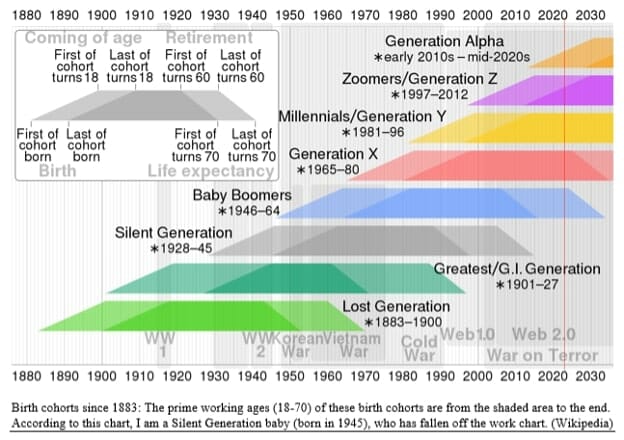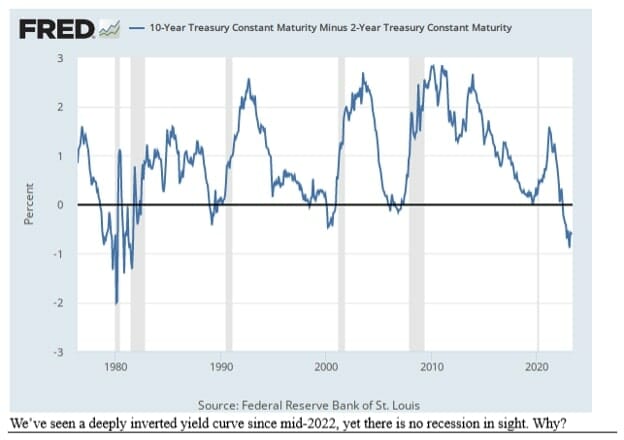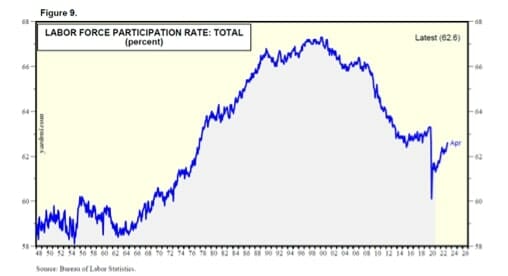For weekend reading, Gary Alexander, senior writer at Navellier & Associates, offers the following commentary:
Come mothers and fathers throughout the land
And don’t criticize what you can’t understand
Your sons and your daughters are beyond your command
Your old road is rapidly aging… For the times they are a-changing
– Bob Dylan, 1963
Bob Dylan turned 82 this week, and I guess he’s a little old fashioned now, too, since he recorded an album of Sinatra standards in 2015 (“Shadows in the Night”) and a Christmas carols album in 2009.
The times are changing in the employment market, too. Work has almost become a four-letter word…
Suzy Welch, 62, a Baby Boomer professor of management practice at NYU’s Stern School of Business and co-author with her late husband Jack of several best-selling business books, wrote a fascinating Op-Ed column in The Wall Street Journal last week (“For Gen Z, Unemployment Can Be a Blast, May 18, 2023).
She introduced her latest batch of “bright and shiny young MBA students” who spoke of their lazy, hazy plans after graduation: “I’ll work when I work. Until then, I’ll just do some funemployment.”
Ms. Welch said she “literally screamed in class” the first time she heard that word, shouting, “What, what, what? Are you literally saying ‘funemployment’ – like unemployment can be fun?” The class then “burst into laughter.”
Yes, of course that’s what they meant, but they were trying to keep that word secret from the older generation of up-tight Baby Boom professors, since those draft-dodging, dope-smoking hippies of the Vietnam era had now become like their parents – and their students didn’t trust anyone over 30!
For those young ones who still want to work, the older employers must also watch their step, since the old hierarchical order at work is mostly dead, if not buried. In his new book, “Generation Why” (released this month), Dr. Karl Moore of Montreal’s McGill University speaks of the new workplace rules, which sound like no rules – a dangerous minefield for managers. In his introduction, Moore makes three points.
There are three basic changes from our (Boomer) management era:
(1) Transparency over secrecy: Young workers can discover all your faults, errors, and past mistakes by surfing the Internet, so transparency is king;
(2) Credentials no longer matter as much; an MBA is the old BA, but experience trumps degrees, so all that massive college debt may be wasted; and
(3) Introverts and quieter thinkers can now lead, not just those bombastic extroverts. By Moore’s measures, 30% to 35% of C-suite leaders are now introverts. *
*To clarify terms, “C-suite” refers to anyone with “Chief” in the title, like Chief Executive Officer, Chief Operating/Chief Financial, or Chief Managing Officer. Also, here are the generally accepted birth cohorts:

Moore has a CEO Insights course at McGill for MBAs. He also takes 30 students each year to some of the fastest growing global economies to see how they do it. He calls it the “Hot Cities of the World Tour.”
They just returned from Ghana and Ivory Coast this March. In these 12-day tours, he also has a chance to dine and talk with these 30 students (Millennials and now Gen Z kids) to probe their views.
As cohorts in two colleges in Southern California in the 1970s, Moore and I emailed over this, and he told me these tours are promoted as “Taking the Future to the Future,” meaning future business leaders go to where the world is growing fastest. Some of his previous trips were to Israel, the UAE, India, and South Africa.
In his study of young workers for this book, Moore conducted over 800 interviews with under-35 workers (and shirkers) in Canada, the U.S., Japan, and all over Europe, as well as over 750 C-suite executives. Previous to his academic career, Moore also spent 11 years working in high tech firms, so he has the advantage of being a capitalist believer and doer, not just a business critic, as is so common in academia.
In the U.S., Moore writes, over one third of workers are Millennials (age 27-42), recently surpassing Gen X as the largest component of our workforce. Globally, there are 1.8 billion Millennials, about a quarter of the world, and 86% of Millennials come from developing economies, which may determine who rules the Century. Put bluntly, will the hardest workers of the world surpass our new funemployment cohort?
How Can We Have A Recession With So Many Job Openings?
A classic warning sign of a recession ahead is an inverted yield curve, which we have endured for nearly a year now without a recession. The yield curve inverted before the last four real recessions, in 1982, 1990, 2000, and 2008.
Even with the artificial 2020 recession, caused by a forced COVID-19 lockdown, the yield curve was neutral before that recession. Today, we have the most inverted yield curve since the double-dip recessions of 1979-82, yet we still stubbornly grow our GDP each quarter since mid-2022.

It’s hard (some say impossible) to have a recession with the unemployment rate at a record low, jobs continuing to expand at a solid pace, nearly 10 million jobs going begging and wages usually outpacing prices, resulting in real wage gains. Everywhere you look, you’re likely to see “HELP NEEDED” signs.
Jobs are opening even faster: The percentage of all U.S. business owners reporting job openings that they cannot fill rose by 2 points to 45% in April — maybe because “funemployment” is still widely preferable?
The labor force participation rate remained at 62.6% in April, below the pre-pandemic reading of 63.3% in February 2020, but that rate itself was historically low. It was over 64% from 1984 to 2012, peaking in 2001, when I argue (in recent columns) that we moved from a Growth economy to a Debt economy.

Funemployment Comes Home to Roost
To close on a personal note, I’ve worked every month since April 1962, age 16, first on a paper route by car, then as a night janitor to work my way through college. I commuted to work at a desk job for nearly 40 years before moving to my late parents’ home in the San Juan Islands of Washington State to work online as an editor. I tried to match the work ethic of my parents, who worked in the Great Depression.
This week marks the date when two of our five grown grandchildren arrive to live with us for the next few months, and maybe longer, as part of their funemployment option. It’s a grandparents’ dream come true, having these wonderful young ones around us – and a great help in our old age, a win-win situation.
One says, “I don’t want to sit in an office from 9 to 5 each day.” I responded, “Neither did I, nor probably 90% of those who did it, but we felt we had to.” These kids already have online and “gig” jobs, not office jobs.
I know I’m old-fashioned about work, but (with Karl Moore) I’m learning from the youth, and I know that both of these two fine youngsters will find fulfilling jobs and careers after living with us, with the caveat that retail jobs, construction, and even janitor work aren’t careers, but training ground for showing up on time, respecting rules, learning manners, and serving customer needs. They’ll find their best work.
It’s a brave new world for old fogies. But it’s comforting to know these kids will soon be old fogies, too.












